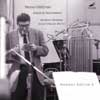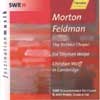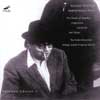Feldman Indeterminate Music
Two varied Feldman banquets to tempt ‘gourmet’ and newcomer alike and one to kill the appetite altogether
View record and artist detailsRecord and Artist Details
Composer or Director: Morton Feldman
Genre:
Vocal
Label: Winter & Winter
Magazine Review Date: 1/2002
Media Format: CD or Download
Media Runtime: 71
Mastering:
Stereo
DDD
Catalogue Number: mode107

Tracks:
| Composition | Artist Credit |
|---|---|
| The O'Hara Songs |
Morton Feldman, Composer
(The) Barton Workshop Charles van Tassel, Baritone James Fulkerson, Conductor Morton Feldman, Composer |
| Four Instruments |
Morton Feldman, Composer
(The) Barton Workshop James Fulkerson, Conductor Morton Feldman, Composer |
| (4) Songs to e.e cummings |
Morton Feldman, Composer
(The) Barton Workshop Claron McFadden, Soprano James Fulkerson, Conductor Morton Feldman, Composer |
| Three Clarinets, Cello and piano |
Morton Feldman, Composer
(The) Barton Workshop James Fulkerson, Conductor Morton Feldman, Composer |
| Intervals |
Morton Feldman, Composer
(The) Barton Workshop Charles van Tassel, Baritone James Fulkerson, Conductor Morton Feldman, Composer |
| Between Categories |
Morton Feldman, Composer
(The) Barton Workshop James Fulkerson, Conductor Morton Feldman, Composer |
| Journey to the End of Night |
Morton Feldman, Composer
(The) Barton Workshop Claron McFadden, Soprano James Fulkerson, Conductor Morton Feldman, Composer |
Composer or Director: Morton Feldman
Genre:
Orchestral
Label: Classic
Magazine Review Date: 1/2002
Media Format: CD or Download
Media Runtime: 61
Mastering:
DDD
Catalogue Number: 93 023

Tracks:
| Composition | Artist Credit |
|---|---|
| Rothko Chapel |
Morton Feldman, Composer
Morton Feldman, Composer Rupert Huber, Conductor South West German Vocal Ensemble |
| For Stephan Wolpe |
Morton Feldman, Composer
Morton Feldman, Composer Rupert Huber, Conductor South West German Vocal Ensemble |
| Christian Wolff in Cambridge |
Morton Feldman, Composer
Morton Feldman, Composer Rupert Huber, Conductor South West German Vocal Ensemble |
Composer or Director: Morton Feldman
Genre:
Chamber
Label: Mode Records
Magazine Review Date: 1/2002
Media Format: CD or Download
Media Runtime: 62
Mastering:
Stereo
DDD
Catalogue Number: MODE103

Tracks:
| Composition | Artist Credit |
|---|---|
| Durations |
Morton Feldman, Composer
Morton Feldman, Composer Philipp Vandré, Piano Thaddeus Watson, Conductor Turfan Ensemble |
| Projection 1 |
Morton Feldman, Composer
Morton Feldman, Composer Philipp Vandré, Piano Thaddeus Watson, Conductor Turfan Ensemble |
| Projection 2 |
Morton Feldman, Composer
Morton Feldman, Composer Philipp Vandré, Piano Thaddeus Watson, Conductor Turfan Ensemble |
| Projection 3 |
Morton Feldman, Composer
Morton Feldman, Composer Philipp Vandré, Piano Thaddeus Watson, Conductor Turfan Ensemble |
| Projection 4 |
Morton Feldman, Composer
Morton Feldman, Composer Philipp Vandré, Piano Thaddeus Watson, Conductor Turfan Ensemble |
| Projection 5 |
Morton Feldman, Composer
Morton Feldman, Composer Philipp Vandré, Piano Thaddeus Watson, Conductor Turfan Ensemble |
| Two Pieces for Six Instruments |
Morton Feldman, Composer
Morton Feldman, Composer Philipp Vandré, Piano Thaddeus Watson, Conductor Turfan Ensemble |
| (The) Straits of Magellan |
Morton Feldman, Composer
Arndt Heyer, Conductor Morton Feldman, Composer Turfan Ensemble |
Author: Peter Dickinson
A good example of this is Durations 3 for violin, tuba and piano. Everything is soft: ‘dynamics are very low,’ Feldman says. The first three movements are slow, with only the higher notes of the tuba protruding like a distant fog-horn. Then the fast fourth movement is a surprise.
It’s extraordinary that both these techniques result in the unique Feldman sound and atmosphere but the players naturally bring a sense of the right style – Feldman once rebuked a student of mine for choosing a minor triad in the graph notation of Projection 2 when, as he put it, she had ‘all the sounds in the world to choose from’. It’s a good idea to have all the Projections and Durations pieces together, fastidiously played and recorded – plus the more lusciously scored Straits of Magellan and Two Pieces. However, there’s a three-CD set on Etcetera (listed above) which provides both of these plus the Vertical Thoughts series and much more.
‘Voices and Instruments’, the fifth volume in the Mode survey, is full of delights, including three first recordings. Now we can compare Feldman’s response to e e cummings with that of John Cage 13 years earlier. By 1951 Feldman is the more pointillistic, showing the influence of Webern, but Claron McFadden is in complete command of the angularities of his extreme tessitura both here and in Journey to the End of the Night, which has a text from the novel by Louis-Ferdinand Celine. Charles van Tassel also feels exactly right in a more subdued role with The O’Hara Songs.
How rewarding to hear Three Clarinets, Cello and Piano (a British commission written for Alan Hacker) where every detail, including the plentiful silences, is precise – Feldman’s finesse requires that kind of dedication. Since so much of Feldman is soft and slow, the sole fortissimo in the work is a poised shock. Feldman enthusiasts will continue to buy the Mode series, which benefits from well-informed CD booklets with full texts, and it ought to make new converts.
Unfortunately Hänssler’s CD is well below the standard of the latest volumes in the Mode series. It gets off to a bad start by claiming Christian Wolff in Cambridge as a première recording. This short unaccompanied choral piece was first released by Odyssey, with the Brandeis University Chamber Chorus under Alvin Lucier in 1967 and is currently available in the US on New World Records , the rest of which was recorded in 2000, including For Stefan Wolpe (1986).
The Christian Wolff piece consists of 16 chords and three single notes, all heard twice. Feldman asks for the duration of each chord to be ‘very slow’. The Brandeis chorus had distinctly weak intonation but merged each chord into the next through the use of staggered breathing. Huber attacks each chord separately, but the impression of the piece as a whole is too rushed. The same is true of the piece for Stefan Wolpe, who was Feldman’s most significant teacher. This time the unaccompanied choir is joined by two vibraphones, but the overall impression lacks the magic associated with Feldman who said he wanted his sounds to be ‘sourceless’ – and there’s some background noise.
Rothko Chapel is a Feldman classic from 1971. Philip Brett directed the California EAR Unit and Berkeley University Chamber Chorus in a well-balanced and recorded performance, along with the only available recording of Why Patterns?, and Richard Whitehouse was very impressed by the Saarbrucken Radio Symphony Chorus and Orchestra under Beat Furrer. So there is little to recommend about this new CD with the competition in Feldman recordings at an increasingly high level.
Discover the world's largest classical music catalogue with Presto Music.

Gramophone Digital Club
- Digital Edition
- Digital Archive
- Reviews Database
- Full website access
From £8.75 / month
Subscribe
Gramophone Full Club
- Print Edition
- Digital Edition
- Digital Archive
- Reviews Database
- Full website access
From £11.00 / month
Subscribe
If you are a library, university or other organisation that would be interested in an institutional subscription to Gramophone please click here for further information.




